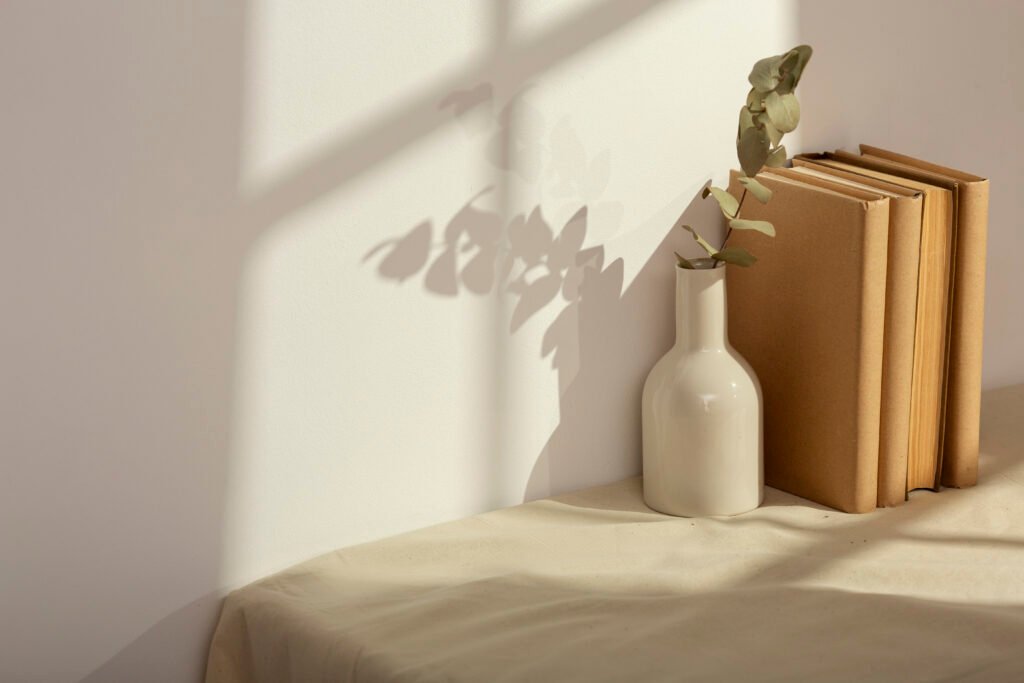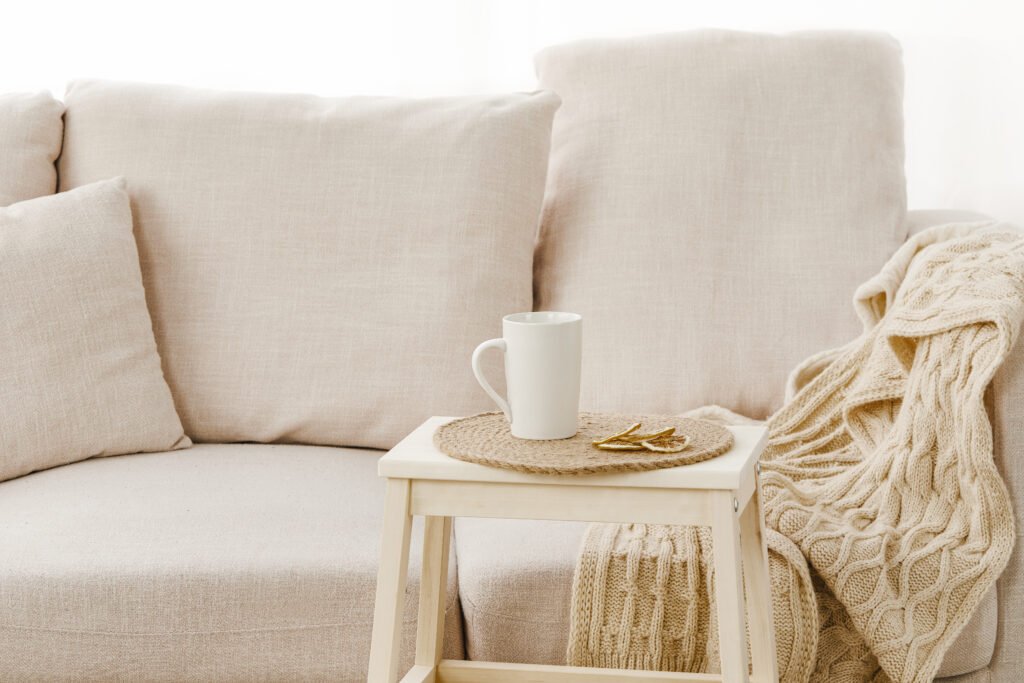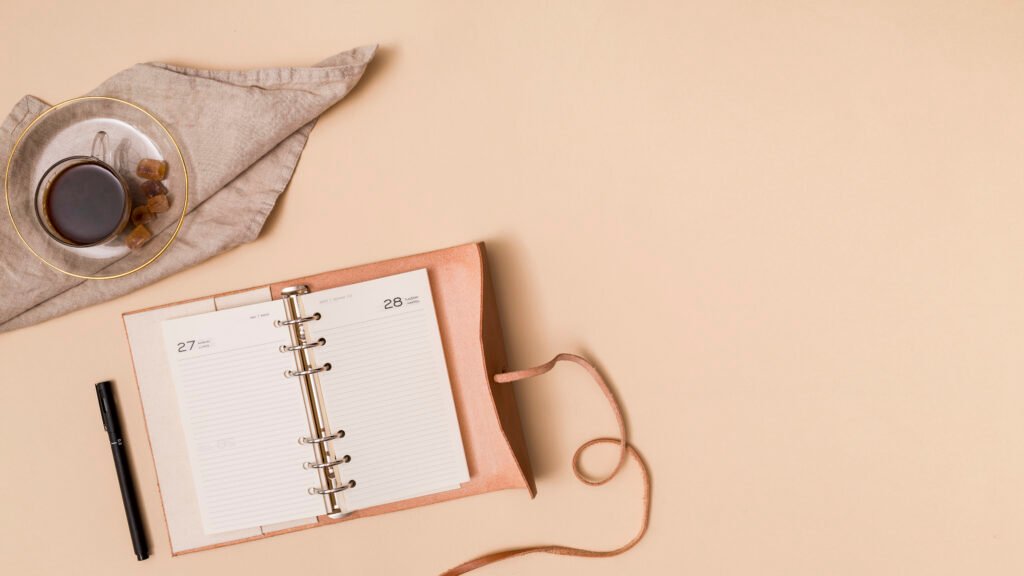A minimalism lifestyle is intentionally living with fewer possessions. It’s about living more simply and focusing only on what you need and what truly matters.

We live in a world where noise, endless information, and the pressure to have ‘more’ surround us every day.
It’s no wonder so many of us feel overwhelmed. Minimalism gives you a little breathing room — it helps clear not just your space, but also your mind.
It’s a gentle reminder to pause and really look at what matters most.
If you’re ready to simplify your life and focus on what truly matters, you’re in the right place.
In this post, I’ll walk you through 21 simple, practical steps you can take over 21 days to start living more minimally. These small daily shifts will help you declutter your home, simplify your routines, and create more space for the things (and people) you love.
Whether you’re brand new to minimalism or just want to bring more intention into your everyday life, this challenge is a beautiful way to begin.
Before we dive into your 21 daily actions for simpler living, let’s first explore what minimalism is all about:
- Owning less: Keep only the things you truly love or need, and let go of the rest. A little space goes a long way.
- Simplifying your days: Make your daily routines easier by cutting out tasks that don’t really matter. Less stress, more calm.
- Choosing experiences over stuff: Focus on moments and people that make life meaningful instead of collecting more things.
- Living gently with the planet: Make small, eco-friendly choices and avoid overbuying to care for the world around you.
In the end, minimalism is about focusing on what really matters.
Own less, live more, and fill your days with meaning while caring for the world around you.
How can a minimalist lifestyle improve your life?
First of all, minimalism helps reduce clutter and stress.
In today’s busy, consumer-driven world, owning too many things can feel overwhelming and even add to anxiety or low mood.
By keeping only what you really need, you create a calm space where you can focus on what truly matters. Moreover, this lifestyle saves money and is kinder to the planet, which also supports better mental clarity and well-being.
If you’re curious about minimalism but not sure where to begin, try these simple everyday steps to get started.
Related: Check out my 21 Wellbeing Challenge, that provides a structured way to make small, consistent changes that, cumulatively, can have a significant impact on your overall quality of life.
The minimalism challenge has 21 easy daily tasks to help you simplify your home, clear your schedule, and support your well-being.
1. Get rid of 1 item per day for 21 days
Make it a daily habit to let go of one thing you don’t really need anymore. Even small steps make a big difference over time.
By the end of the challenge, your space will feel lighter and more organized.
2. Try a “no spend” challenge for 3 days
For three days, try not to buy anything that isn’t truly necessary.
This simple break from spending can help you see what you really need and make you more grateful for what you already have.
3. Declutter your kitchen: choose one drawer and get rid of unused or unnecessary items
Start by focusing on just one drawer so it doesn’t feel overwhelming. Take out anything you don’t use or need.
Then, organise what’s left — group similar items together and use separators or small boxes to give each group its own space.
As a result, your kitchen will feel tidier, calmer, and easier to use.
For more support on decluttering, I highly recommend one of the best books ever written on the topic — “The Life-Changing Magic of Tidying Up: The Japanese Art of Decluttering and Organizing” by Marie Kondō. It’s a beautifully simple and inspiring guide to creating a tidy, peaceful home.
4. Simplify Your Bathroom: Use Fewer Products and Tidy Up a Drawer
Take a moment to look at the products you actually use every day and keep only the ones that matter.
Then, choose a cabinet or drawer, clear it out, and organise what’s left. After clearing things out, your bathroom will feel cleaner, calmer, and a lot less cluttered.
5. Try a digital detox and limit your screen time for a week
Challenge yourself to slowly cut down your screen time over the course of a week. In its place, try enjoying simple offline moments—like going for a walk, reading a book, having a real conversation, or just sitting with a cup of tea.
As a result, you’ll likely feel more present, less stressed, and more connected to the world around you.
6. Pick 1-5 things that you can donate from your home
Start by picking a few items that are still in good shape but no longer needed.
Then, instead of letting them sit around, donate them to someone who can actually use them.
This simple step not only clears space in your home, but also helps others and spreads a little kindness in your community.
7. Clear out your bookshelf and give away books you no longer need or want
Go through your books and pick out the ones you no longer feel attached to.
Share them with your loved ones, neighbours, or colleagues so they can enjoy them too.
This way, you free up space and keep your collection filled with what truly inspires you.
8. Clean your phone from apps you don’t use
Not sure about you, but my phone is always shouting that I’m running out of storage!
So, take a little time to go through it and uninstall apps you no longer use or that don’t really add value to your day.
By doing this, clearing out your digital clutter not only frees up space but also makes using your phone less distracting and a lot more peaceful.
9. Clean your personal email to free some space
Take some time to tidy up your inbox by deleting old emails and unsubscribing from newsletters you no longer read.
This way, your email becomes easier to manage, and you can quickly find the important messages.
Plus, having a cleaner inbox gives you a nice sense of digital calm and clarity.
10. Get rid of excess furniture and create more space in your home
If your space feels tight or crowded, it doesn’t always mean you need a bigger place.
Instead, take a closer look at your furniture.

Ask yourself which pieces are really essential and which ones you rarely use.
By removing the extras, you can instantly open up your space, making it feel more spacious and welcoming. Not only that, simplifying your furniture can also improve the flow and overall comfort of your home.
11. Eliminate duplicates and get rid of unnecessary multiples (such as multiple sets of dishes or bedding)
We all have some gifted items that end up taking up space, even when we don’t really need them.
So, take a look around and notice things you have in excess, like extra dishes or extra bedding sets.
By keeping only what you truly use, you can cut down on clutter and make organizing much easier.
Plus, having fewer duplicates means your belongings feel more intentional and manageable.
12. Practice single-tasking. No multitasking. One thing at once!
In today’s busy world, we’re all multitaskers – trying to get a lot done in a short amount of time. This is especially true for moms.
However, juggling too many things at once can actually increase stress and make us less efficient.
Instead, try focusing on one task at a time.
Giving your full attention to a single activity not only boosts your efficiency but also helps reduce stress.
At the same time, embracing single-tasking encourages mindfulness and brings more clarity to your daily routine.
13. Say no to something
Honestly, ask yourself—are you taking care of others more than yourself?
If so, try making a conscious effort to say no to one commitment or request that doesn’t really align with your priorities.
By doing this, you protect your time and energy for what truly matters.
Over time, this small habit can help you create a more balanced and intentional life.
14. Get rid of old or expired items in your fridge and pantry
Time for the fridge and pantry!
Start by going through your kitchen and removing any expired or stale items.
Not only does this keep your food safe, but it also helps reduce waste.
Plus, an organized pantry makes meal planning and cooking easier and more enjoyable.
15. Turn off non-essential notifications
The nonstop beeps, vibrations, and notifications from your laptop, phone, or even smartwatch can create a constant background noise throughout the day.
Over time, this digital clutter can affect your well-being, making it hard to focus on tasks or enjoy conversations.
To bring a bit of minimalism into your digital life, review your phone and computer settings and turn off notifications that aren’t truly necessary.
As a result, you’ll reduce interruptions and create a calmer, more focused digital space.
With fewer distractions, it’s easier to concentrate on what really matters and lower stress.
16. Write tomorrow’s to-do list before going to sleep
Spend a few minutes each night writing down your priorities and tasks for the next day.
This small habit helps clear your mind and sets a calm tone for the morning.
Even better, use a journal instead of your phone or computer, since too much screen time before bed can affect sleep quality.
Planning ahead like this reduces anxiety and makes it easier to stay productive.

17. Get rid of unused or broken electronics and appliances
Over time, it’s easy to collect gadgets and appliances that just sit around gathering dust.
Take a moment to look through your home and notice what no longer works or simply isn’t being used.
Once you let go of these items, you’ll free up valuable space and make your home feel lighter.
On top of that, some things can even be recycled or passed on to someone who can use them. It’s a simple, practical way to keep your space clutter-free and more intentional.
18. Spend 10 minutes unsubscribing from emails
It can be so overwhelming to open Gmail and see hundreds of unread emails piling up.
I get it — most of them are just promotional messages you might have once cared about but don’t anymore. And with all that noise, it’s easy to miss something truly important.
Instead of letting it build up, take a few minutes to unsubscribe from email lists you no longer find useful.
Little by little, this simple habit clears out digital clutter and makes your inbox feel so much lighter. It will become much easier to spot the messages that actually matter to you.
19. Choose one living room drawer and clean it, sort it and throw away old stuff
Let’s head over to the living room.
Pick one drawer to start with—it’s much easier to make progress when you keep things simple.
Begin by taking everything out so you can actually see what’s inside. Then, go through each item and decide what truly deserves a place there. If something’s outdated or no longer useful, let it go. Organise what’s left.
Before you know it, that small, intentional effort will bring more calm and order to your living space.
20. Get into the habit of putting things back where they belong
(e.g., placing your toothbrush back after brushing or hanging your jacket in the closet when you get home)
How to keep things tidy after organizing?
Once everything has its own spot, the key to maintaining a sense of minimalism is consistency.
Make it a gentle daily routine to return items to their proper place right after using them.
Over time, this simple habit becomes second nature, and you’ll notice how much easier it is to keep your home tidy without overwhelming clean-up sessions.
A little effort each day goes a long way in supporting a calm, clutter-free minimalist lifestyle.
21. Get rid of sentimental items that no longer serve a purpose in your life
Sentimental things can be the hardest to sort through. I totally understand.
Gently take the time to reflect on each item and ask yourself whether it still truly holds meaning for you.
Letting go of objects that no longer carry the same emotional weight can feel surprisingly freeing.
Instead of holding on to everything, choose to keep only the pieces that genuinely warm your heart. This mindful approach creates more space in your home and supports a lifestyle rooted in minimalism.
Each task in this 21-Day Minimalism Challenge is designed to gently simplify your life and make room for what truly matters.
Related post: Why you should consider decluttering as one of your goals this year?
These challenges are just a few ideas, and there are really plenty of other ways to bring minimalism into your daily routine.
Ultimately, whether a minimalist lifestyle feels right for you depends on your own values, goals, and also preferences.
For many people, living with less can be a simple yet powerful way to reduce stress, create more space, and also enjoy a calmer plus more intentional life.
Download the schedule below and enjoy the journey.
Images in the post are designed by Freepik




Leave a Reply